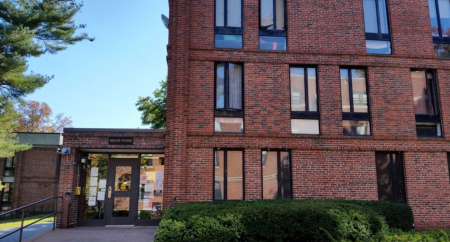Trinity Hall
Trinity Hall is located in the “South Campus Neighborhood,” which also includes Elton, Funston, Jackson, Jones, Smith, Summit East, and Summit North and South. Trinity Hall is the temporary name of a dormitory for first-year students. It was formerly named Wheaton Hall for Nathaniel Wheaton, Trinity's second president (1831-1837).
Trinity Hall was constructed after a decision by the Trustees in January 1964 to increase the College's enrollment. Financed through the federal Housing and Home Finance Agency, Trinity Hall was one of three dorms built at the same time, all named after former Trinity College presidents (Wheaton, Jackson, and Smith). The buildings were finished in 1966 and were known as a unit as “South Campus dormitory.” The outdoor area enclosed by these buildings has also been called the “concrete jungle” by students. Each building has single rooms as well as multi-room suites.
The dormitory also houses the College's Health Center and shares a common space with the neighboring Jackson Hall dormitory. Floors are separated by gender, with three Residential Advisors and two leaders from the Promoting Respect for Inclusive Diversity in Education (P.R.I.D.E.) peer mentor program also living in the dormitory.
In the wake of national outcry over the death of George Floyd on May 25, 2020, a number of Trinity's student groups under the Umoja Coalition called for the renaming of (Nathaniel) Wheaton Hall and (Bishop Samuel) Seabury Hall. In their June 2020 list of demands, Umoja Coalition claimed that “both figures, while deeply revered in Trinity’s history, were outright racists and defended slavery on a number of instances.” With the unanimous support of the Board of Trustees, President Joanne Berger-Sweeney stated on July 7, 2020, in response to the Umoja Coalition's demands, that “members of the Trinity community this fall [should] consider naming issues more broadly—to look at not only who’s honored and whether that’s appropriate, but also who isn’t honored and how we might address it. These community members will help us figure out whose names and stories could or should be celebrated and what names should adorn our campus buildings and spaces.”
At a meeting on April 28, 2021, the Board of Trustees “voted unanimously in support of a recommendation to remove the name from Wheaton Hall, named for Nathaniel Wheaton, and to rename it temporarily as Trinity Hall.” The decision was made in tandem with the re-initiation of a college-wide Committee on Named Facilities and Commemoratives to make the Trinity campus more equitable in its naming practices. According to President Berger-Sweeney, “the Committee on Named Facilities and Commemoratives will propose a new name for the building in due course.”
Nathaniel Wheaton was known to have owned one slave and published pro-slavery material titled, “A Discourse on St. Paul's Epistle to Philemon: Exhibiting the Duty of Citizens of the Northern States in Regard to the Institution of Slavery; Delivered in Christ Church, Hartford; Dec. 22, 1850.” In this discourse, Wheaton spoke of a fugitive slave, who upon encountering St. Paul, “is shown the wrong he has done his master, and sent back to him.” Wheaton also stated, “Is not obedience in the slave, according to the apostolic standard, made a duty as sacred as any other duty, social or moral?”
Sources
The Bantam Network: Neighborhoods and Residential Communities
The Bantam Network-Trinity Hall
Trinity College-Board of Trustees Meeting Updates, April 28, 2021.
Trinity Tripod, 04/06/2021, pp. 3, 6.
Office of the President - Letters to the Community: Naming Buildings at Trinity (President Joanne Berger-Sweeney), March 31, 2021.
Office of the President - Letters to the Community: A Message of Hope and a Call to Act (President Joanne Berger-Sweeney), July 1-7, 2020.
Umoja Coalition of Trinity College's Black Organizations: Trinity College Demands 2020
Trinity College in the Twentieth Century: a History (2000) by Peter and Anne Knapp, pp. 255-256.
A Discourse on St. Paul's Epistle to Philemon (1851) by N. S. Wheaton.
